#slaver Christianity
Note
you might have already answered this but what does satanism mean to you?
Satanism makes sense only as a reaction to and inversion of Christianity. "If poverty is the work of God, then I'm with the devil."
Partially that's accepting that you were likely raised Christian and if not, you still came to exist in a culturally Christian environment where the default was Christianity and your worldview was irreparably shaped by this.
"Irreparably" because, while Christianity is large and contains multitudes as much as it can be said to contain contradictions, the strains that became dominant with European colonialism and capitalism were those that justified "might is right" and consecrated the power of some blessed by God to enslave and abuse those without power.
So our Satanism says, "Yes, capitalism's power feels overwhelming. But Lucifer named himself and had the courage to fight omnipotence. Although he didn't overthrow heaven then, the fight continues, and as long as we fight, we will never ever lose."
Ideas of revolutionary struggle exist in lots of religions, including Christianity. But Satanism can allow a person to create their own religious meaning without pilfering from existing ones except insofar as you look at Christianity and say, "What you call evil, I embrace."
Where this goes astray is LaVeyan Satanism and its antecedent in the extreme social Darwinism, misogyny, racism, antisemitism, and anti-egalitarianism of Arthur Desmond's book "Might Is Right". Both looked at a sort of Christianity that was rhetorically concerned with upending the existing social order and aligning with those at the bottom of society, and they took it at face value as being Christianity actually. Both Anton LaVey and Desmond talked of a Christianity that no one looking at the United States' history of a slaver religion would even recognize.
So when you invert kindness and community as ideals, you get bog-standard libertarian individualism and douchebaggery. Which is what Satanism has been and worse for most of the past fifty years.
But if you invert slaver Christianity, you should get the religion of liberation for all at any costs, and that's what we find attractive about Satanism as a concept and historically, pre-LaVey.
58 notes
·
View notes
Text
reading the dsm-5 and wow is it obvious how much psychologists look down on their patients
#i feel like treatment for mental illness should be structured around creating and sustaining independence and literally nothing else#the entry on autism literally reads like 'OMG THIS FREAK CAN'T MANAGE SMALL TALK ... '#'IF WE NORMALIZE THESE TRAITS OUR GOOD CHRISTIAN NATION WILL CRUMBLE TO THE SLAVERING HORDES OF THE SOCIALLY AWKWARD'#like ok. and. thats not really a symptom that needs correcting you weirdo#id say its one step away from social eugenics but given the dialogue around treatment it literally just is social eugenics
1 note
·
View note
Text
September 9th marks the 284th anniversary of The Stono Rebellion of 1739✊🏾
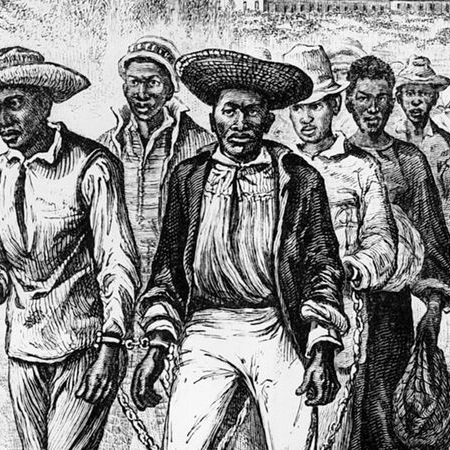
When an Angolan brotha called, Jemmy, led a band of 20 slaves into rebellion on the banks of the Stono River in Charleston, S.C., which put unprecedented fear in Whites. It was because of this uprising that laws were enacted that outlawd the enslaved from learning how to read, gathering in groups, & growing their own food. Thus, making it one of the most significant rebellions in the history of the U.S. colonies.
Jemmy & the rebel band marched southbound on a road toward the river, carrying banners that proclaimed their war very, "Liberty!". Their numbers swelled with more enslaved women and men as they went. By nightfall, 100 rebels had joined the cause. They broke into a local firearms store, arming themselves with guns & ammo. As they marched, they killed every overseer in their path and forced any reluctant slaves to join them.
From there the band marched toward the house of a Mr. Godfrey, where they burned the house & killed Godfrey and his family. It was just shy of dawn when they reached Wallace's Tavern. Because the innkeeper at the tavern was kind to his slaves, his life was spared. The White inhabitants of the next several houses in their path were all slaughtered. Those enslaved by a Thomas Rose reluctantly joined the rebellion, but not before hiding their slaver - of which they were later rewarded for. Still, many more rebels gladly joined the cause. By this point, a Lieutenant Governor Bull eluded the rebels & rode on horseback to spread the alarm. Once the band reached the Edisto River, Whites colonists set out in armed pursuit. Shots were exchanged across both lines. By dusk, about 30 rebels had fallen & at least 30 more had escaped. In the end, most rebels were captured over the next month, then executed. The remainder were pursued and captured over the following 6mo - all except 1 who remained a fugitive for 3 years. The few survivors were sold off to plantations in the West Indies.
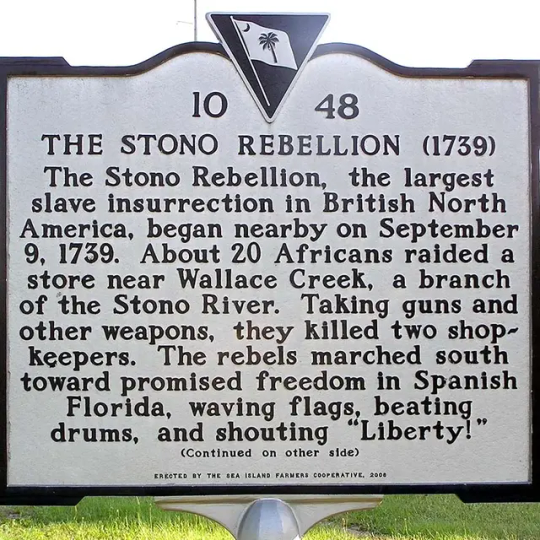
The immediate factors that sparked the uprising remain uncertain. Many rebels knew of small groups of runaways had made their way from SC to FL, where they had been given freedom and land. There was also an ongoing malaria epidemic surging across SC. Ultimately, this unprecedented act of rebellion demanded unprecedented legislature. The European colonists finalized a Negro Act into law which aggressively limited the privileges & movement of the enslaved. No longer would slaves be allowed to grow their own food, assemble in groups, earn their own money, or learn to read. Some of these restrictions had been in effect before the Negro Act of 1740, but had not been strictly enforced. This also resulted in the forced indoctrination of slaves into Christian schools systems.
Let us remember Brother Jemmy and those who fought, willingly or not, against the colonizers. Their sacrifice may have set a great legal precedent in European colonizer politics, but it set an even greater one that would spark many fires and fan many more flames of rebellion, war, and freedom. Every step taken from this moment onward was a necessary one to achieve our "freedom" as we experience it today.
We pour libations of water (especiallyfrom the Stono River), speak their names, & offer prayers toward their elevation.
‼️Note: offering suggestions are just that & strictly for veneration purposes only. Never attempt to conjure up any spirit or entity without proper divination/Mediumship counsel.‼️
#hoodoo#hoodoos#atr#the hoodoo calendar#atrs#the Stono Rebellion#stono river#Angola#Angolan#slave rebellion#south carolina
337 notes
·
View notes
Text
Baby Monk {Osferth}
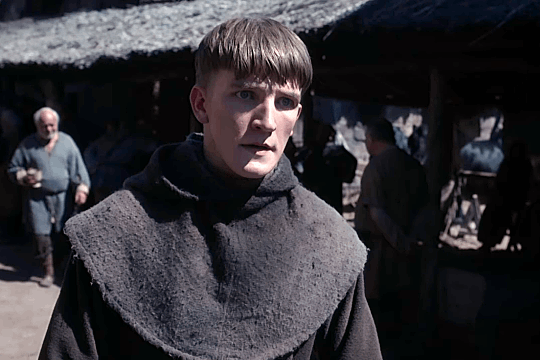
Summary: You save the Baby Monk from Finan’s constant teasing
Osferth x fem!reader
Word count: 859
Warnings: Nothing :)
“Finan, leave him alone.” Your voice sounded as you approached the two men. Finan could often be found poking fun at the warrior-monk, and to your dismay the ladder accepting it.
“Must you always take the fun out of it?” Finan asked with a groan, turning to face you. You smiled slightly, patting the man on the shoulder before nodding your head in the direction of the others who were setting up camp.
“Uhtred is looking for you.” You told the man, Finan leaving without another word. You turned your attention to Osferth, a small sigh slipping past your lips. “You shouldn’t let Finan mock you so much.” You told him, making Osferth look at you shocked. Normally when you would tell Finan to leave him alone, you would go after him and never give Osferth a second glance. It was no joke between the others that Osferth had feelings for you. The others found it entertaining, you thought it was cute when his face would burn bright when you would talk to him.
“It makes him happy.” Osferth spoke quietly, looking down to the leaves under his feet.
“Does it make you happy?” You asked, cranking your neck so he would look at you. “Osferth, just because others find joy in something, doesn’t mean you should always allow it.” You told him, giving him a small smile when he finally met your eyes. “Finan is a great man, and he finds humor where he can… don’t allow yourself to be on the wrong end of his jokes.” You turned to walk away from the man, leaving him to dwell on your words when he called after you.
“(Y/N)?” You hummed as you glanced over your shoulder at him. “Why are you being nice to me?” If your heart could shatter upon hearing mere words you were sure it would have.
“Us bastards should stick together.” You finally said, a small laugh leaving your lips as you offered your hand to him. “If I didn’t have Sihtric growing up… well let’s just say you have many people around that look at you like a little brother now, and I’m afraid I have been a little cold towards you.” You never knew how to take Osferth’s crush on you. Never had anyone looked at you with pink cheeks, stuttering over their words as they spoke to you. Your brother, Sihtric, found joy in the fact that someone had finally made you nervous, even if he was a Christian man. Sihtric hated the idea of marrying you off, it was his responsibility since you had no one else, but he also knew you had the soul of a warrior.
You had been alongside Sihtric your entire lives, and when he swore to serve Uhtred, you followed your brother. Finan had joined your little band of warriors after him and Uhtred had been saved from the slavers, and Osferth was the last to join. You didn’t have high hopes for the monk when he first joined Uhtred’s service, he had no experience with a sword, and had never witnessed a battle. You assumed he would have died quickly, but he surprised you.
“You haven’t been cold towards me.” Osferth told you finally, moving his hand from yours so he could situate the two of you so you were linking arms instead. “I just assumed you didn’t like me.” He told you truthfully.
“I’m afraid that is far from the truth.” you didn’t intend to say it outloud, but the words had spilled from your lips before you could take them back.
“Really?” The grin of his face was enough to make any woman weak in the knees.
“Yes, really.” You told him, a smile to match his falling upon you. “I’m afraid I’m not great with emotions.” You said, looking from him and back to the trees that surrounded the two of you as you walked. “So being around you has sometimes made me nervous.”
“I make you nervous?” Osferth asked, making you roll your eyes at his new found ego.
“If you’re going to start teasing like Finan, maybe I should stop intervening to save you the trouble.”
“Forgive me, (Y/N). I just can’t find it in myself to believe that a warrior like yourself would like a monk.” Osferth told you truthfully, his head bowing as he spoke. You pulled him to a stop, tilting your chin to meet his gaze as you smiled softly.
“I may not care for your God Osferth, but that does not mean I cannot care for you.” You told him, leaning up slightly and pressing a kiss to his cheek. “Now,” You cleared your throat to admire his pink cheeks slightly. “The others are waiting for us.” You told him, stepping away from him to continue the walk back to the rest of the group.
Osferth watched you walk away, his mouth slightly agape. He could feel the heat radiating off his face, which made it even worse knowing he had to go back to face the others like this. “Come along baby Monk!” You called, not looking over your shoulder.
“Coming!”
#osferth#osferth x reader#finan#finan x reader#sihtric#sihtric x reader#uhtred#uhtred x reader#ragnar x reader#young ragnar#erik thurgilson#erik x reader#brida#father beocca#baby monk#warrior monk
716 notes
·
View notes
Text
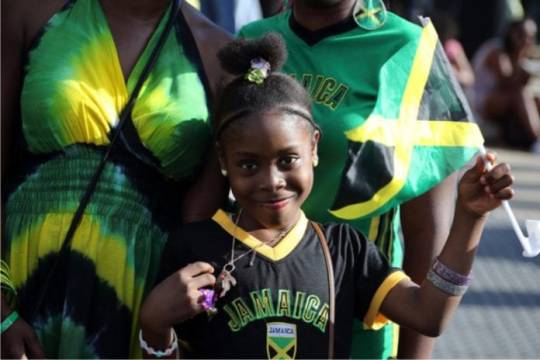

Afro-Jamaicans are Jamaicans of predominant African descent. They represent the largest ethnic group in the country.
The ethnogenesis of the African Jamaican people stemmed from the Atlantic slave trade of the 16th century, when enslaved Africans were transported as slaves to Jamaica and other parts of the Americas. During the period of British rule, slaves brought into Jamaica were primarily Akan, some of whom ran away and joined with Maroons and even took over as leaders
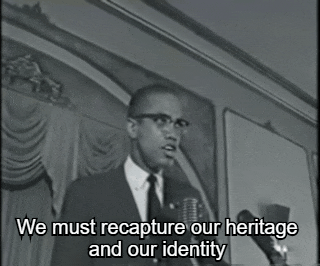
West Africans were enslaved in wars with other West African states and kidnapped by either African or European slavers. The most common means of enslaving an African was through abduction.
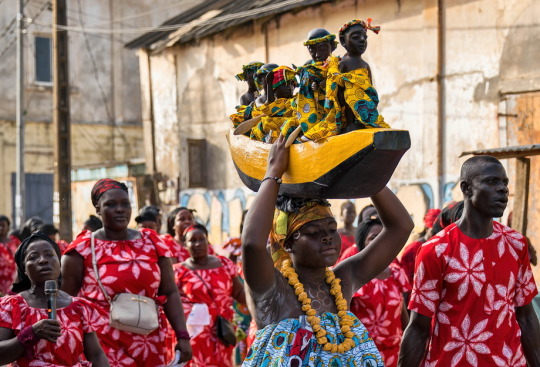
Based on slave ship records, enslaved Africans mostly came from the Akan people (notably those of the Asante Kotoko alliance of the 1720's: Asante, Bono, Wassa, Nzema and Ahanta) followed by Kongo people, Fon people, Ewe people, and to a lesser degree: Yoruba, Ibibio people and Igbo people. Akan (then called Coromantee) culture was the dominant African culture in Jamaica.
Originally in earlier British colonization, the island before the 1750s was in fact mainly Akan imported. However, between 1663 and 1700, only six per cent of slave ships to Jamaica listed their origin as the Gold Coast, while between 1700 and 1720 that figure went up to 27 per cent. The number of Akan slaves arriving in Jamaica from Kormantin ports only increased in the early 18th century. But due to frequent rebellions from the then known "Coromantee" that often joined the slave rebellion group known as the Jamaican Maroons, other groups were sent to Jamaica. The Akan population was still maintained, since they were the preference of British planters in Jamaica because they were "better workers", according to these planters. According to the Slave Voyages Archives, though the Igbo had the highest importation numbers, they were only imported to Montego Bay and St. Ann's Bay ports, while the Akan (mainly Gold Coast) were more dispersed across the island and were a majority imported to seven of 14 of the island's ports (each parish has one port).

Myal and Revival
Kumfu (from the word Akom the name of the Akan spiritual system) was documented as Myal and originally only found in books, while the term Kumfu is still used by Jamaican Maroons. The priest of Kumfu was called a Kumfu-man. In 18th-century Jamaica, only Akan gods were worshipped by Akan as well as by other enslaved Africans. The Akan god of creation, Nyankopong was given praise but not worshipped directly. They poured libation to Asase Ya, the goddess of the earth. But nowadays they are only observed by the Maroons who preserved a lot of the culture of 1700s Jamaica.
"Myal" or Kumfu evolved into Revival, a syncretic Christian sect. Kumfu followers gravitated to the American Revival of 1800 Seventh Day Adventist movement because it observed Saturday as god's day of rest. This was a shared aboriginal belief of the Akan people as this too was the day that the Akan god, Nyame, rested after creating the earth. Jamaicans that were aware of their Ashanti past while wanting to keep hidden, mixed their Kumfu spirituality with the American Adventists to create Jamaican Revival in 1860. Revival has two sects: 60 order (or Zion Revival, the order of the heavens) and 61 order (or Pocomania, the order of the earth). 60 order worships God and spirits of air or the heavens on a Saturday and considers itself to be the more "clean" sect. 61 order more deals with spirits of the earth. This division of Kumfu clearly shows the dichotomy of Nyame and Asase Yaa's relationship, Nyame representing air and has his 60 order'; Asase Yaa having her 61 order of the earth. Also the Ashanti funerary/war colours: red and black have the same meaning in Revival of vengeance. Other Ashanti elements include the use of swords and rings as means to guard the spirit from spiritual attack. The Asantehene, like the Mother Woman of Revival, has special two swords used to protect himself from witchcraft called an Akrafena or soul sword and a Bosomfena or spirit sword

Jamaican Patois, known locally as Patwa, is an English creole language spoken primarily in Jamaica and the Jamaican diaspora. It is not to be confused with Jamaican English nor with the Rastafarian use of English. The language developed in the 17th century, when enslaved peoples from West and Central Africa blended their dialect and terms with the learned vernacular and dialectal forms of English spoken: British Englishes (including significant exposure to Scottish English) and Hiberno English. Jamaican Patwa is a post-creole speech continuum (a linguistic continuum) meaning that the variety of the language closest to the lexifier language (the acrolect) cannot be distinguished systematically from intermediate varieties (collectively referred to as the mesolect) nor even from the most divergent rural varieties (collectively referred to as the basilect). Jamaicans themselves usually refer to their use of English as patwa, a term without a precise linguistic definition.
Jamaican Patois contains many loanwords of African origin, a majority of those etymologically from Gold Coast region (particularly of the Asante-Twi dialect of the Akan language of Ghana).
Most Jamaican proverbs are of Asante people, while some included other African proverbs

Jamaican mtDNA
A DNA test study submitted to BMC Medicine in 2012 states that "....despite the historical evidence that an overwhelming majority of slaves were sent from the Bight of Biafra and West-central Africa near the end of the British slave trade, the mtDNA haplogroup profile of modern Jamaicans show a greater affinity with groups found in the present-day Gold Coast region Ghana....this is because Africans arriving from the Gold Coast may have thus found the acclimatization and acculturation process less stressful because of cultural and linguistic commonalities, leading ultimately to a greater chance of survivorship and a greater number of progeny."
More detailed results stated: "Using haplogroup distributions to calculate parental population contribution, the largest admixture coefficient was associated with the Gold Coast(0.477 ± 0.12 or 59.7% of the Jamaican population with a 2.7 chance of Pygmy and Sahelian mixture), suggesting that the people from this region may have been consistently prolific throughout the slave era on Jamaica. The diminutive admixture coefficients associated with the Bight of Biafra and West-central Africa (0.064 ± 0.05 and 0.089 ± 0.05, respectively) is striking considering the massive influx of individuals from these areas in the waning years of the British Slave trade. When excluding the pygmy groups, the contribution from the Bight of Biafra and West-central rise to their highest levels (0.095 ± 0.08 and 0.109 ± 0.06, respectively), though still far from a major contribution. When admixture coefficients were calculated by assessing shared haplotypes, the Gold Coast also had the largest contribution, though much less striking at 0.196, with a 95% confidence interval of 0.189 to 0.203. When haplotypes are allowed to differ by one base pair, the Jamaican matriline shows the greatest affinity with the Bight of Benin, though both Bight of Biafra and West-central Africa remain underrepresented. The results of the admixture analysis suggest the mtDNA haplogroup profile distribution of Jamaica more closely resembles that of aggregated populations from the modern-day Gold Coast region despite an increasing influx of individuals from both the Bight of Biafra and West-central Africa during the final years of trading enslaved Africans.
The aforementioned results apply to subjects whom have been tested. Results also stated that African Jamaicans (that make up more than 90% of the population) on an average have 97.5% of African MtDNA and very little European or Asian ancestry could be found. Both ethnic and racial genetic results are based on a low sample of 390 Jamaican persons and limited regional representation within Jamaica. As Afro-Jamaicans are not genetically homogeneous, the results for other subjects may yield different results.

#african#afrakan#kemetic dreams#africans#brownskin#brown skin#afrakans#african culture#afrakan spirituality#asante#jamaican#benin#bight of biafra#gold coast#mtdna#afro jamaicans#twi#west africa#africa#algeria#uganda#ethiopia#ghana#myal#rastafari#rasta#rastaman#rasta love#kisumi amau#tegan and sara
86 notes
·
View notes
Text
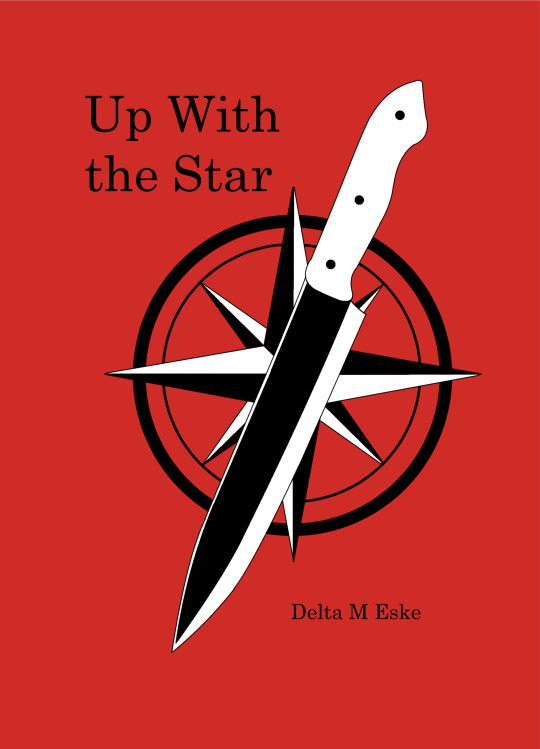
Six years ago, after killing her father, she was stripped of her name, then sold into gladiatorial slavery in the Dead Nation, an imperialistic slaver nation consuming huge portions of the Midwest. Now, three days after a coup that started with the Iconoclast's cannibalistic destruction of the previous Warlord, the Iconoclast asks her--wouldn't you like like to make everyone have to respect you? Wouldn't it be nice to have power and make them all listen? She agrees, and ascends into power as the Nameless Warlord.
And then the assassination attempts start.
Paperback | Kindle | Gumroad (PDF) | itch.io (PDF) | itch.io (audio)
My novel Up With the Star comes out today, Friday, September 8! It features a whole cast of queer characters and is set in an America that has fallen apart and reformed itself into scores of smaller states, some at war with each other, some at peace, some federated, some not. The main character is one of the Nameless, a manufactured underclass produced by one of the largest political bodies on the North American continent. She hails from a small state that was formed by christofascist secessionists around a century before the story starts, and was cast out after her values failed to align with those of her birthplace, in a rather spectacular manner.
After the Iconoclast's violent assassination of the previous leader of a different political body, she's nominated to take his place by the Iconoclast, as well as her friends Conway--an ex-POW who now works in commerce--and Marta--a highly-regarded trauma surgeon at the gladiatorial pits, the home of post-dissolution America's favorite sport, the site of quite a lot of augury and oracular functions, and the main characters "workplace." She takes the job on the offering of being able to spite the people who made her Nameless. Wouldn't it nice to be powerful and respected? Wouldn't it be nice to be in charge, just once?
Great for people who like adult transmasc characters, characters who are struggling with christianity, doctors, scenes about food, estranged families, fictional grandmas, and people motivated by spite, and can tolerate suicidal ideation, blood, violence, christianity, and sex scenes.
#del did a thing#up with the star#the gladiator#here she is :) excited to have this novel published#the gumroad and itch pdfs are the same ftr theyre just on different platforms#ill update this post and reblog the new version when amazon comes through for me here on paperback/kindle
99 notes
·
View notes
Text
Vash fails, over and over and often he makes things even worse by trying to save someone. Humanity hurts him and then kicks him while he's down. All that relentless cruelty, greed, and selfishness, he witnesses and it subjected to. And he sympathizes with the desperation driving a lot of the awfulness and moral poverty, kidnapping travelers and selling their organs to feed their families. Despite crawling through the worst of humanity he still continues to hold nothing but compassion for them. He never stops believing in the good in humanity that even with all the wretchedness that little bit if good is worth it. He gives everyone a chance all the chances and protects them even when it leads to a worse outcome, even when I and most people would agree both in universe and out that they don't deserve it. The sex slavers and rapists and all those who have hurt others and will only continue to do so, Vash has nothing but compassion for them. He's a fool for it and for his refusal to kill, this is my opinion, and the manga in particular goes out of it's way to show how by refusing to kill Vash makes things worse sometimes. Yet I also admire him for it for sticking to his beliefs no matter how much life seems to take every opportunity to break them. Vash keeps trying and he keeps losing those philosophical battles, the lives of others, his physical and emotional wellbeing. He rarely succeeds at anything or ever makes the overall situation better but still in that effort he manages to touch the lives of so many people.
I saw this other post a while back about the irony of how wolfwood masquerades as a priest while having given up on faith while vash embodies faith. Vash really is faithful, not in a religious way (although nightow went hard on the christianity aesthetic for the sake of looking cool), but he believes unwaveringly without substance to back it, and in the face of constant evidence to the contrary. God awful things happen to pretty much everyone on Gumsmoke without end, relentless darkness and despair, and still Vash holds faith in those little glimmers of goodness and kindness and connection that shine through on the rare occasion.
(Vash's relationship with humanity where he's like a beaten dog that comes back for pets from the same hand that hit him is kinda unhealthy but that's for other posts)
31 notes
·
View notes
Text
While the Historical Paul has been subject to a dizzying array of historical reconstructions, what is rarely questioned is the assumption that whatever Paul is historically reconstructed via these operations will serve as a foundational figure for ethics, morality, politics, and theology. Cut away some pseudepigrapha here, contextualize an embarrassing statement over there, build a few analogical links between his context and ours, and we will get a Paul that can ground our ethics. Of course, not everyone in the field is invested in Paul's continuing relevance, but I think most Pauline scholars are interested in him because, at some level, they are convinced that a properly historicized Paul has something to say to their corner of (post)modernity.
A good example of how this process works is Eric C. Smith's recent monograph Paul the Progressive? Smith, a historian of early Christianity, writes for a progressive Christian audience while drawing from the rhetorical techniques of historicism to transform Paul into a modern progressive ally: "After years of studying Paul within the academic field of biblical studies, I have come to see [Paul] as one of the most misunderstood figures of the Bible and the Christian tradition. . . . The Paul that is revealed in careful study of his letters is nothing like the person so many progressive Christians hate, and, in fact, he shares many progressive Christian values".
[ . . . ]
Take, for example, Smith's chapter on Paul and slavery. He is at pains to absolve Paul of criticism for the historical support that the apostle's archive has given to slavery, ancient and modern. His approach takes several steps, some of which follow his scholarly "ground rules." First, he subtracts from Paul any references to slavery that come from deutero-Pauline literature (notably Ephesians, Colossians, and the pastoral Epistles). This gets rid of the most baldly pro-slavery passages in the Pauline archive. Turning to the uncontested letters of Paul, Smith argues that Paul's advice to slaves in 1 Corinthians 7 to remain in their state is much more ambiguous than most modern translations suggest and that Paul might be encouraging slaves to take the opportunity to gain their freedom if the possibility presents itself. But even this reading of Paul's advice hardly counts as "progressive." Manumission was a regular part of ancient slavery, something many slaves could count on and expect. Manumission was also used by ancient slavers as an inducement to good behavior that ultimately served as a means of maintaining the system itself, a point made forcefully by Jennifer Glancy. Paul's advice to slaves, charitably read, was to work within the system as it was set up.
[ . . . ]
We might think that accepting the institution of slavery would disqualify Paul as a progressive, but this is where Smith's rhetorical moves subtly shift the goalposts. First, he compares his pared-down Paul with the worst excesses of the American slave system, which gives the impression that Paul was not that bad. Pointing to the explicitly pro-slavery statements in the deutero-Paulines, Smith concludes that "it was not Paul's writings that were to blame, or Paul himself, but it was the misuse of Paul, both deliberate and accidental," that put him on the side of slavery as an institution. Smith assumes that the Christian texts written after Paul in his name represent a betrayal of Paul's theological vision. He does not entertain the possibility that these later devotees of the apostle saw him as an ally in their support for the ancient status quo and not as a problematic progressive needing to be contained.
Second, Smith recontextualizes Paul so as to take away the blame somewhat for his acceptance of slavery. He does this by claiming Paul believed that the world would soon end, thus making him less likely to try to overturn accepted social institutions. Paul's world was one in which slavery was normal, and he should not be blamed for accepting slavery as a given. Finally, Smith can conclude that Paul was not a "slavery apologist," which is the question that frames the entire chapter. What is so rhetorically clever here is that the entire chapter sets the goalposts in the most convenient location for Smith: Paul is absolved of being a full-throated supporter of slavery. What Smith has shown is that Paul accepted slavery as normal; he even felt comfortable enough playing with the terminology of human enslavement in his own self-descriptions. This hardly strikes me as an argument that Paul ought to be reclaimed as a progressive.
Even Smith seems somewhat abashed at making such an argument: "With the help of modern biblical scholarship we can recover a Paul who is far from a slavery apologist, and who might even be an ally in the struggle for emancipation". Smith's tepid endorsement of a Paul who "might even be an ally" should force us to ask the question, At what cost have we paid for Paul's own emancipation from his entanglement with slavery? Smith has pared Paul down, recontextualized him, lowered the bar, and still can't produce a Paul who can say that slavery is wrong, full stop. What are we saying to readers who have lived with the historical weight of the Pauline archive's support of slavery when we ask them to welcome someone who only "might" be an ally in their struggle? This strategy is what Joseph Marchal has recently called "pinkwashing Paul," in which a progressive figuration of the apostle is offered, "while ignoring or downplaying his letters' ambivalences, complicities, and recapitulations of imperializing and sexual naturalizing trajectories." More to the point: Why is Paul's purity so important? Why does he have to be the hero of our historical work? Must we value (or revere?) the corpora we study?
Cavan Concannon, Profaning Paul
28 notes
·
View notes
Text
Bariss as a terrorist is not problematic just because a good and kind character get assasinated to prop up the MC without any preparation, or bc we lost a good example of a good Master-Padawan relationship, hence giving ammunition to anti-jedi. It’s also, and mostly, because of racism.
The Mirialans are Muslim-coded, they are all women who wear the veil. It doesn't come out of nowhere if fans think that. In the West, if we think “veiled women”, we think Muslims. If the news talks about the problem of the veil, they are talking about the Muslim veil, not the Hindu veil, not the Amish veil, not the Christian veil, and no one hearing them will think for a second that they are talking about things other than the veil Muslim. The veil is a very characteristic element of Muslims for an average person.
(In the movies, Luminara and Bariss aren't even played by white actresses, so we can't say it's 'just a veil, nothing deeper behind'.)
The West has a history with Muslims and terrorism. 9/11 still has an impact today, even more so during the making of TCW. So using a veiled woman as a terrorist is clumsy at best, and not having bad intentions doesn’t erase the impact this representation has.
This reinforces the stereotype of the Muslim terrorist used to harass and oppress members of this religion. I don’t make this “shortcut” between Bariss Muslim-coded and terrorism because I think all Muslims are terrorists. I do it because I live in a country where the veil is considered a symbol of evil, where women who wear it are insulted and attacked, where laws are created to prohibit them from displaying their religion and/or culture.
The fact that the writers chose Bariss to play this role is certainly intellectual laziness, but they could, and should, have thought about what that entailed. “Think before you act” is not a lesson that only applies to Jedi.
Never heard of ‘queer-coded villains’? This is when authors attribute traits associated with queer people to bad guys, hence demonizing these traits. Did these authors think their villains were queer? In the vast majority of cases, no. They simply used traits often associated with villains to emphasize the evil side of theirs without thinking more than that. The absence of bad intentions does not cancel out the damage it causes.
And all this reflection is based on the principle that the parallel between the Mirialans and the Muslims is involuntary. I haven't seen a quote from LucasFilm saying anything, but I find it hard to believe. The Jedi were created to be extremely diverse, in direct opposition to the Empire made up of mostly old white human men, and this is not the first time that Lucas has drawn inspiration from cultures and religions existing in our world, especially Arab populations. There is no reason to think that he did not intentionally use Muslims to create Bariss and Luminara.
The most absurd thing is to think that LucasFilm is incapable of being racist. These are the same people who whitewashed the clones, who used Arab populations as very clear inspiration for a group of violent slavers who communicate only through pig squeals and will be massacred by a white man without any real consequences. The same people who, after being acquired by Disney, will replace a black character with his white neo-Nazi abuser in his role as main character/love interest, who will whitewash an already animated character, who will create clones superior to the others who are incidentally more white, who will cast a white actress for a character who clearly had Arab features in animation.
So no, we don’t have a problem with Bariss being Muslim-coded bc we think Muslims are terrorists, but bc the stereotype of Muslims being terrorists exists and is extremely harmful to the Muslim community.
If you can’t see that, check your own bias and bigotry.
#LucasfIlm could have used one of the younglings from the arc where Ahsoka was kidnapped by hunters#we would have had the motivation and it would have been the opportunity to explain why no one was looking for them#(because that too gave ammunition to the anti-Jedi)#ahsoka tano#wrong jedi arc#the clone wars#anti TCW#star wars#racism#pro jedi#islamophobia#barriss offee
35 notes
·
View notes
Text
When most Westerners, especially the secular ones, think of religion they think of something they have seen in their own cultures and societies, i.e., Christianity, Judaism, Hinduism, and Buddhism.
And quite naturally, since most of them lack the insight and knowledge to understand Islam properly, they tend to lump it in with the other religions. That is a big mistake.
Islam can be properly described as a totalitarian way of life and a highly effective system of conquest, disguised as a religion.
Islam is totalitarian, not just in the sense of theocratic and dictatorial regimes, but also in the sense that there is virtually no part of a believer’s life that is not touched or influenced in some manner by it.
Virtually everything a Muslim does is influenced or guided by his faith, by Sharia law, or both.
In this sense, free will as Westerners and other non-Muslims understand it, is anathema to those inhabiting Dar al-Islam, the “House of Islam.”
Likewise, there is no real analog to the Western notion of liberty or freedom. The Arabic word most closely corresponding to “freedom” is typically said to be “hurriya,” but this is false for the term does not correspond to “liberty” or “freedom” in the sense that an American, for example, would understand it.
It instead means “freedom” to do as “Allah wills” for that individual.
Many traditional religious faiths and systems have laws or codes of law which attach to them.
What makes Sharia (Islamic) law unique, however, is that in theory, it applies not only to Muslims but to non-Muslims as well. At least that is what the Koran, the Hadith, and the Sira command.
Non-Muslims or kafirs, also known as infidels, ~ are denied the most basic of human rights under Islamic suzerainty.
They are most often akin to slaves, serfs, or supplicants, and even those non-Muslim dhimmis who serve a useful purpose to the sultan or caliph and survive on that basis, are still treated with inhuman brutality and can be beaten or slain at the whim of any Muslim male.
Most Westerners are familiar with the history of slavery, but how many know that Muslims have been the greatest slavers in history?
Which is to say, the most prolific takers, buyers, and sellers of slaves in history.
Even today, in many parts of the Islamic world, the Arabic word for slave, “Abd,” is synonymous with the slang or informal word for a black man.
Although the Muslims took many millions of black Africans as slaves, they likewise took many millions of Europeans and other peoples as slaves from temperate climates further north, venturing as far north as Ireland and Iceland on slave-taking raids.
As some of you may know, the very first war fought by the United States as an independent nation was the Barbary War of 1801-1805 (with a brief flare-up in 1815), fought against Islamic raiders and pirates off the coast of North Africa.
These nautical jihadists had been seizing American shipping and holding the passengers and cargo for ransom. President Thomas Jefferson grew tired of their demands and sent the U.S. Navy and Marine Corps to Tripoli to teach them a lesson.
Various Islamic potentates, rulers, and warlords have infamously slain infidels by the multitudes down through the centuries.
According to the work of historians and political scientists who have studied such phenomena, the greatest or largest single genocide in human history was committed by the Islamic Mughal Empire in what is now the Indian sub-continent over years in the 15th century.
During that time, an estimated 270 million Hindus and other non-Muslims were put to the sword.
So many were slain that the streets ran with blood and giant pyramids of human skulls were erected by the soldiers of Allah.
Of course, many other empires and nations have committed acts of genocide, but such wanton bloodletting is impressive even by the standards of the worst tyrants of the 20th century, who had modern industrial warfare and weapons at their disposal but did not manage to even approach the totals of the Mughal Empire.
Historians consider the Armenian genocide (1915-1921) to be the first “modern” genocide since it was the first such atrocity that was recorded by still and motion-picture photography.
The Sunni Muslim Ottoman Empire in what is now modern-day Turkey was responsible for it and even today, under the government of Recep Erdogan, the president of Turkey, it is still a crime to speak or write of the extermination of the Armenians and Greeks, most of whom were Christians.
Anyone who has seen the haunting photos of young girls, Christian virgins, crucified by their captors and slowly dying in the hot sun in the desert, will never forget them.
These basic historical facts about Islam used to be widely known and taught across the West, but they have been politely airbrushed out of our history in recent decades, and now few people know of them …. or the danger presented by the soldiers of Allah.

21 notes
·
View notes
Text
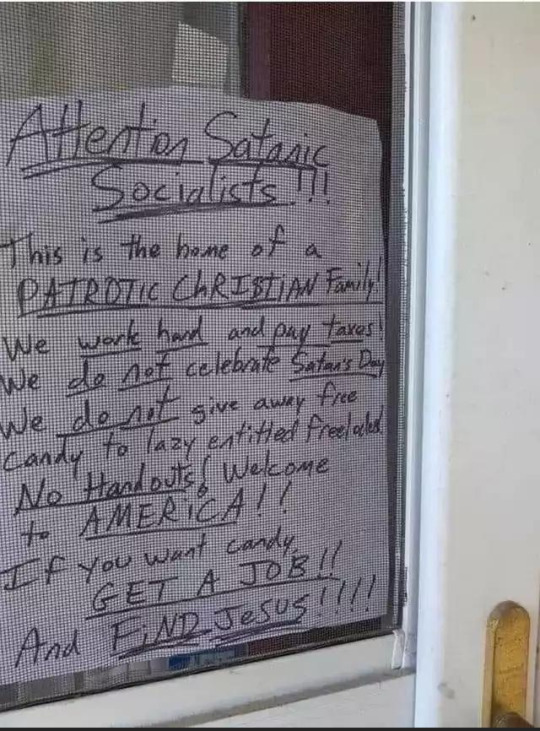
Someone in r/exchristian made the observation that viral, anti-Halloween sign doesn't seem to make sense given that Christmas is "handouts" on a much bigger scale
but that actually points to a key element of understanding "generosity" within American slaver Christianity
The sign:
[Handwritten note behind a mesh window. Some of the words are underlined and/or all caps for emphasis. "
*Attention Satanic Socialists*!!! This is the home of a *Patriotic Christian Family*!
We *work hard* and *pay taxes*!
We *do not* celebrate *Satan's Day*
We *do not give away free candy to lazy entitled freeloaders!
*No Handouts*! Welcome to *America*!!
If you want candy, **Get A Job**!! and *Find Jesus*!!!!]
The reason why giving out the pittance of Halloween candy is more offensive to these people than buying extravagant Christmas gifts is that, traditionally, you can't control who shows up at your door.
If trick-or-treaters knock, you are obliged to provide candy.
A white evangelical can be generous, of course. A Christian business owner might give out a bonus on Christmas, for example. An extravagant bonus, even.
But they’d rather shut down than let a union take hold, let alone a co-op.
So long as those Christians retain the power in the gifts they extend, they can always recall their gifts.
They may be willing to be extremely charitable in lots of things—but never power.
Because if told to obliterate earthly hierarchies—exactly as their most radical, inerrant scriptures call for explicitly—you’ll see slaver Christians become vicious and cruel beyond imagination preserving their wealth, racial privilege, patriarchy, etc.
Slaver Christians don’t hate socialism because it makes anything worse or anyone worse off.
No, they hate socialism because they and those they deem deserving of power would lose some ability to control others they regard as undeserving.
The end of these Christians' ability to control, coerce, and dominate others is terrifying and repugnant to them b/c they can only ever imagine being a slaver or enslaved; if they don't have the whip, they assume they're the slave
They can't imagine everyone equal and free.
Moreover, we’re still being sued by The Satanic Temple in federal court. TST is now *also* suing Newsweek for writing about us and that case. Check the pinned post for more.
#Christianity#slaver Christianity#exChristian#r/exchristian#satanic socialism#satanic socialists#anarcho-satanism
243 notes
·
View notes
Text

Africans, Europeans, Middle Easterners, Native Americans, Asians and so on, and this is just me talking about the slavery that went on during the only period in history in which you people seem to care about slavery.
Yes, Europeans had slaves, but they didn't run into the Congo with nets, they bought them from local African kingdoms, Dahomey, Kanem Bornu, Kingdom of Allada, Aro Confederacy, Ashanti Empire, Songhai Empire and the Mali Empire to name a few.
These African nations grew fat and opulent on money gained from "slaving," however they are never critiqued, never condemned by your side, but those, like the British, who put a stop to the slave trade in the west, are condemned and anyone who speaks out against this blatant racist bias, is condemned as a nazi or white supremacist, as you and the one you reblogged from have done.
No, instead people who believe as you do make movies glorifying the worst slavers in Africa, such as when Hollywood decided to make "the Woman King," a movie glorifying the Dahomey slavers.
Let's read what the Late King of Dahomey said when the British ended the slave trade, king Ghezo said; "The slave trade is the ruling principle of my people. It is the source and the glory of their wealth…the mother lulls the child to sleep with notes of triumph over an enemy reduced to slavery." Coincidentally he was played by John Boyega in the film, despite having been long dead by the time the film is meant to take place.
Oh, then we have the Indian Ocean slave trade which took Africans from east Africa, mainly the Christian kingdom of Ethiopia, and traded them to areas of India and Asia, then we have the Arab slave trade which took slaves from east Africa, North Africa, Europe, India and Asia, btw this was all happening at the same time as the Trans Atlantic, however you won't find slave descendants in these areas, why?
They castrated male slaves prior to selling them.
An even better fact is this, the Arab and Asian slave trade of Africans and other races is still going on today, it hasn't stopped, and today more than 30 million people are slaves globally, but that's a conservative estimate, it could be far higher.
In fact, let's use this very liberal estimate map from the global slavery index;

And would you look at that, you're so preoccupied with condemning an entire race for something we willingly ended hundreds of years ago, while ignoring the ongoing slavery around the world, oh, but you can't actually do anything about that so you'd prefer to virtue signal online rather than campaign to end slavery globally, after all one is easy and gives you immediate gratification by your online circlejerk while the other you may never see the end result of.
Personally I choose the latter, why?
Blessed are those who plant trees knowing that they shall never sit in the shade of their foliage.
103 notes
·
View notes
Note
I have no idea why but I absolutely hate how Ameridan' story was handled, they basically dumbed it down to him worshipping both the creators and andraste/chant of light, which kind of proved Cassandra's dumb (and incredibly disrespectful) point of an inquisitor having "room for another god". It's also so unfair how they made the evanuris to just be power hungry slavers and tyrants, my only hope is that if the creators were disproving then I hope it would be the same for the chant of light and maker (seeing asnit was solas who made the veil and not the creator) I really hate how centrist the game has gotten, like flat out, whenever I hear the words grey morality and nuance I can't help burn cringe, that's how much dragon age has ruined it for me.
It's also so incredibly funny how the devs are genuinely surprised that most of the players are pro mage, like of course we are?
i think it's particularly extremely aggravating, the way bioware writers write about a pantheon as if polytheistic religions are simply a thing of the past and dead and some kind of mystery/mythology. according to bioware, this kind of writing for polytheistic religions is fine because no real religion these days would everrrrrrr worship multiple gods /sarcasm. (note that the links are just some examples and not comprehensive in the least)
there's a lot of writing choices i quite simply disagree with in dai, and there's some that are just... i don't even disagree with them because that implies it's something to argue about. some of their writing choices are just wrong. after borrowing so heavily from ethnic groups to shape their fictional histories, the disrespect of writing their fictional oppressed minorities as being responsible for their own oppression because they were not "open" enough to include/absorb expy christianity into their religious beliefs and fought back against violent colonialism. the resulting clumsy collation between isr*el and the indigenous people of the americas wanting to reclaim their lands stolen from them by white colonisers makes my blood boil.
ameridan is just another piece of the puzzle that makes me seethe. we have a man who apparently ~existed before hostilities between the elves and the humans~ which is now the fault of drakon's son who invaded the dales after ameridan was long gone. that's already absolute bullshit because ameridan lived in the fucking dales. elves only started living in the dales AFTER ANDRASTE'S REBELLION. after the fall of arlathan, and hundreds of years of enslavement at the hands of tevinter humans???
additionally, the battle of red crossing happened in 2:9 glory, but tensions between the elves and humans had been building up since the second blight. drakon the first died in 1:45 but the elves apparently did "nothing" to help montsimmard when it was overrun by darkspawn in 1:25 divine - twenty years before his death, there was already simmering resentment. additionally, it was drakon the first that expanded the orlesian empire and the orlesian chantry - wotv2 notes his battles against the darkspawn did more to spread the chant of light (specifically, the orlesian chant of light which he, yknow, fucking made up) than any of his other attempts. by the time the exalted march on the dales happens, over three quarters of thedas is under orlesian rule. maferath himself handed the dales to the surviving elves from andraste's campaign in -165 ancient and the elves lived in the dales peacefully until the orlesian chantry was salivating at its borders. and the orlesian chantry has a history of wiping out "cults" - i.e. other sects of their own religion that differ from belief, no matter how minor, to their own. including, notably, the wholesale genocide of a non-violent sect centered around fertility rituals and, later, the dragon worshipping sect in haven off their own land. (and i'm willing to BET MONEY that they were originally alamarri themselves, considering that andraste was brought there to rest, and considering how cultural variance in religion usually occurs [i.e. through the blending/adoption of folk beliefs or the cultural/religious practices from Before]. so the andrastians slaughtered the cult AND THEN TOOK THEIR FUCKING LAND.)
the entire way andrastianism is treated in inquisition makes me violent. and unfortunately, it does not look like it's going to change - there's been multiple statements about how the maker's existence will continue to remain "a mystery" out of a reluctance to confirm or deny the existence of a One True God which, coupled with how they've shat on every other religion in the game - the tevinter chantry, the qun, the stone, the elven pantheon, every other sect worshipping the maker/andraste - gives me absolutely no hope that the writing team is going to get their heads out of their asses about it.
#asks#bioware critical#dai critical#and tbh at this point i really think anyone acting like the writing team is being geniuses or whatever is kinda racist and deluded lmao#most polytheistic religions surviving today are inextricably linked to ethnicity and culture and rich histories of surviving and resisting#colonialist attempts to wipe them out. i feel like comparatively there's fewer polytheistic religions in ''the west'' (more specifically#rooted in white culture) as a result of that. but bioware didn't borrow from THOSE white-rooted polytheistic religions and cultures#they borrowed from native; jewish; roma; even hinduism when it came to the dalish elves but people want to act like the only thing bioware#is pulling from is fucking norse mythology. borrowing character archetypes from norse mythology and planting them onto your#fictional ethnic minorities based off real life religions and people. IS NOT ACTUALLY GOOD WRITING. when you dont CONSIDER the implications#like Gods Not Being Good or having Separate Morals To Humans is a huge theme for norse mythology#but not so much afaik in other polytheistic religions TODAY???#fucking bioware SHOULD HAVE JUST USED NORSE MYTHOLOGY AS A BASE FOR THE ELVES FROM THE START#and NOT brought other ethnic groups into it???#the moment they did they SHOULD HAVE been considering the implications of their writing. and that they didn't and continue NOT TO#is actually something people are allowed to be fucking upset about!!!!
88 notes
·
View notes
Text
Today we venerate Ancestor & Hoodoo Saint Nat Turner on his 223rd birthday 🎉
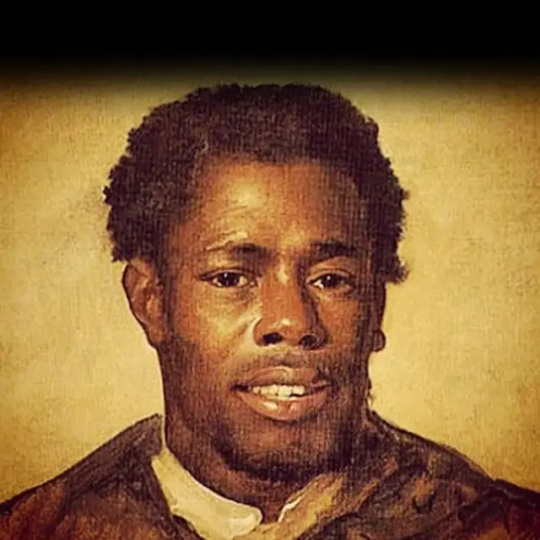
King Nat was a Seer, prophet, preacher, & Freedom Fighter who used his intuitive gifts to spearhead one of the greatest slave rebellions in U.S. History; one that would shift the trajectory of Black lives under Maafa for decades to come.
King Nat was born enslaved on the Benjamin Turner plantation in Southampton Co., VA. He was a highly intuitive and gifted child. He could easily recall events that took place in his life as early as 3 or 4 years old. He also foretold of events that occurred before his time. His grandmother was a deeply spiritual elder and nurtured his spiritual development. His mother and many of those enslaved on the Turner plantation knew that he would become a prophet & was surely destined for a higher purpose.
For his "uncommon intelligence ", Nat learned to read & write at a young age at which time he was also indoctrinated into Christianity. His interpretation of the Christian bible convinced him that the Christian God condemned Slavery. This inspired him to become a preacher.
By age 21, King Nat was a prolific Seer & was known as, "The Prophet". Nat received many visions & Divine messages over the course of his life. Much of which guided him to avenge slavery & free our peoples from bondage. He had a series of 3 visions that would set him on course to fulfilling his highest purpose, thus forever impressing his name upon in U.S. history.
The 1st vision came as he was following in his father's footsteps, fleeing the plantation. To everyone's astonishment he returned of his own volition after spending 30 days in the woods because, “the Spirit appeared to [him] and said [he] had [his] wishes directed to the things of this world, and not to the kingdom of heaven, and that [he] should return to the service of [his] earthly master.” One year later, the devil died.
On May 12, 1828, Nat he received a 2nd vision, as he witnessed a solar eclipse. He “heard a loud noise in the heavens, and the Spirit instantly appeared to me and said the serpent was loosened, and Christ had laid down the yoke he had borne for the sins of men, and that I should take it on and fight against the serpent, for the time was fast approaching when the first should be last and the last should be first.” This, he believed to be the sign he had been promised.
On, August 13th 1831, Spirit delivered a 3rd message; in the form of lights across the night sky. At which time, an atmospheric disturbance across the sky in the aftermath of an eruption at Mount St. Helen's (3,000 mi away) caused the Sun to appear bluish-green in color. Nat prayed to learn their meaning. For Nat, this reaffirmed the work that he'd been called to do; to move forward with his mission to avenge Slavery & free those he could. From then on his plans were set into motion.
At 2am on August 22nd, King Nat led his peers & allies into rebellion. They struck their slaver's household first; slaughtering the entire family. From there they went from house to house, killing every single devil in their path. By noon, they marched toward the neighboring town of Jerusalem where a White militia of 3,000 men lie in wait for them.
Most of the rebels were either captured or killed - except for Nat. He managed to escape & eluded Virginian authorities for 2mo. He hid in the woods just miles from his former slaver's plantation. He was discovered on October 30th by an armed farmer who stumbled across him hiding in a foxhole. Emaciated and weak, he surrendered willingly. After his arrest, Turner was taken back to Jerusalem where he stood trial & was convicted, then sentenced to death by hanging. Nat was killed on November 11th.
To our deepest disdain & no suprise, he was denied a formal burial. Instead, his body was taken to doctors for dissection, to be distributed among affluent White families. He was skinned to make their purses. His flesh was turned into grease. And his bones were divided up into trophies. These became heirloom souvenirs to be passereceive among these affluent White families for generations.
Although King Nat did not end slavery as he had hoped, he & his allies avenged those who wronged them, and they did, ultimately, achieve their freedom from this world. Nat became immortalized as a symbol; of warrior strength (for us) & a catalyst of White fear. King Nat single-handedly shook the institution of Slavert at its core. So much that it stretched the divide between Pro-Slavers & Abolitionists. Pro-slavery advocates began calling for greater restrictions on "Freefolk" & demanded that Abolitionists cease their interference with Slavery. In Virginia, politicians saw Nat's intelligence & education as a major threat, thus outlawing the practice of teaching enslaved Peoples how to read or write. Abolitionists' efforts to end Slavery only intensified. This set the stage in U.S politics for the Civil War.
"I had a vision - and I saw white spirits and black spirits engaged in battle, and the sun was darkened - the thunder rolled in the Heavens, and blood flowed in streams - and I heard a voice saying, 'Such is your luck, such are you called to see, and let it come rough or smooth, you must surely bear it." - Nat Turner; "Confessions of Nat Turner".
Let us remember that it was more than bravery, nerve, & standing ten toes down that drove King Nat's rebellion to success. It was, first and foremost, leading with Spirit & trusting in our intuitive/Ancestral gifts.
We pour libations & give him💐 today as we celebrate him for his gifts, Divine trust, bravery, and sacrifice. May we lift him up in prayer & offering in gratitude & lace toward his elevation.
Offering suggestions: prayers toward his healing/elevation, a Methodist bible, libations of water - especially on the battlegrounds of rebellion in Courtland, VA/Benjamin Turner plantation/, read & share his confessions
‼️Note: offering suggestions are just that & strictly for veneration purposes only. Never attempt to conjure up any spirit or entity without proper divination/Mediumship counsel.‼️
#the hoodoo calendar#hoodoo#hoodoos#atr#atrs#ancestor veneration#nat turner#Nat Turner day#hoodoo heritage month
153 notes
·
View notes
Photo


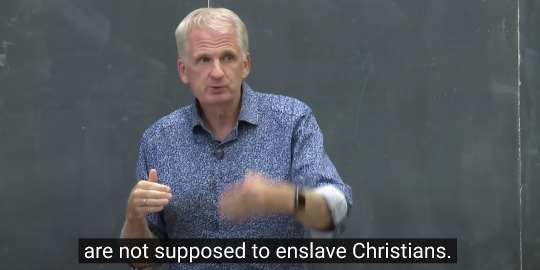
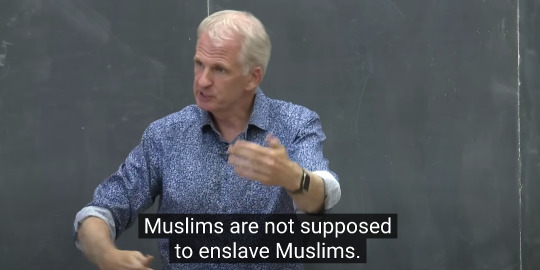
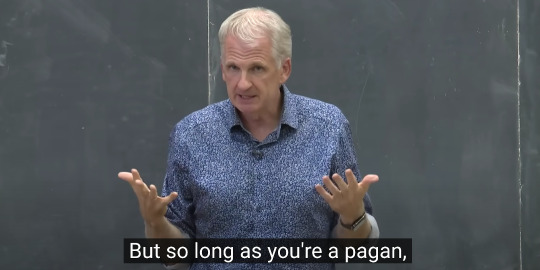




“Try to think what Christianity looked like to pagans, from the point of view of the 9th and 10th and 11th centuries.
To make a long story short, it's almost always true that when you convert as a ruler, you're not converting because you believe. Sorry.
You might believe, I'm not saying it's impossible, but you're generally converting because the religion in question is bringing something to you that your native cult does not have.
Like, for example, a written language, a set of elites who can use that written language, who can be your ambassadors and your bureaucrats, like legitimacy with other states, right?
So from the point of view of pagan rulers looking outward at this world, the math was working against them.
What do I mean by the math? The math of slavery, okay? If you're a pagan, everyone can enslave you.
And for a while, you might say, "Well, I can enslave everyone else. I can enslave other pagans, Christians, Muslims."
And so long as the power balance is on your side, that may seem like an acceptable answer.
For the Grand Duchy of Lithuania, that was an acceptable answer all the way until the 14th century.
They did much more enslaving than people did enslaving of their people. They stayed pagans for a very long time. It worked for them.
But what I mean by the math is that Christians are not supposed to enslave Christians. Muslims are not supposed to enslave Muslims.
When Christian and Muslim states fight, they'll do exchanges and so on. But so long as you're a pagan, you're fair game for everyone.
And so territorially, as Christianity spreads into Europe, there are more and more of them, and fewer and fewer of you, right?
So every time some other state converts to Christianity, the math is getting worse for you as a pagan.
There are more and more situations where you can be enslaved, and fewer and fewer situations where you're gonna find it practicable to enslave other people.
It's just kind of a general logic. Okay, I realize that's a strange answer to the question of what is Christianity.
But what is Christianity is fundamentally a way of joining a Christian order of states in which you're not supposed to enslave the other people, who are also subjects of a Christian order of state.”
Source: Timothy Snyder: The Making of Modern Ukraine. Class 5: Vikings, Slavers, Lawgivers: The Kyiv State
208 notes
·
View notes
Text




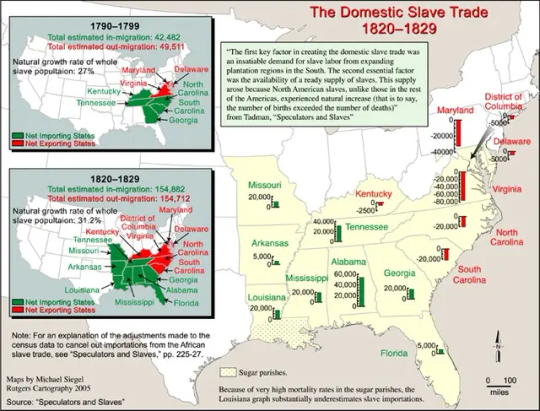
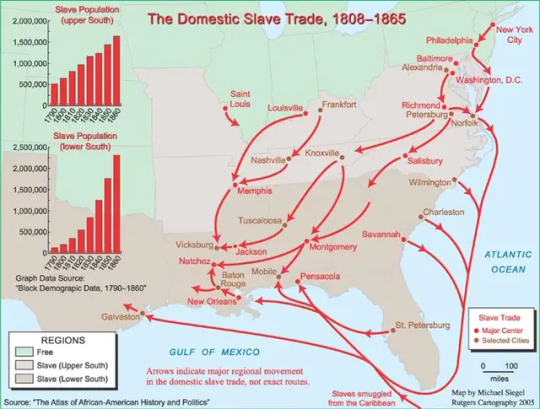

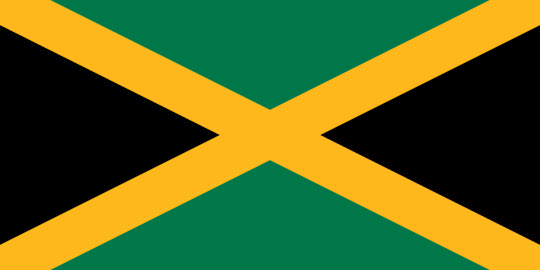
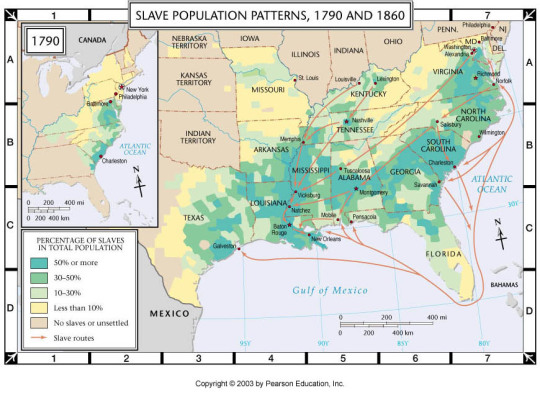


The Igbo in the Atlantic slave trade
Bussa, Barbadian slave revolt leader of Igbo descent
Edward Blyden, Americo-Liberian educator, writer and politician of Igbo descent
Paul Robeson, American actor and writer whose father was of Igbo descent
Aimé Césaire, Martiniquais poet and politician who claimed Igbo descent) argues that many of the slaves taken from the Bight of Biafra across the Middle Passage would have been Igbo. These slaves were usually sold to Europeans by the Aro Confederacy, who kidnapped or bought slaves from Igbo villages in the hinterland. Igbo slaves may have not been victims of slave-raiding wars or expeditions but perhaps debtors or Igbo people who committed within their communities alleged crimes. With the goal for freedom, enslaved Igbo people were known to European planters as being rebellious and having a high rate of suicide to escape slavery. There is evidence that traders sought Igbo women. Igbo women were paired with Coromantee (Akan) men to subdue the men because of the belief that the women were bound to their first-born sons’ birthplace.
It is alleged that European slave traders were fairly well informed about various African ethnicities, leading to slavers targeting certain ethnic groups which plantation owners preferred. Particular desired ethnic groups consequently became fairly concentrated in certain parts of the Americas. The Igbo were dispersed to colonies such as Jamaica, Cuba, Saint-Domingue, Barbados, Colonial America, Belize and Trinidad and Tobago, among others.
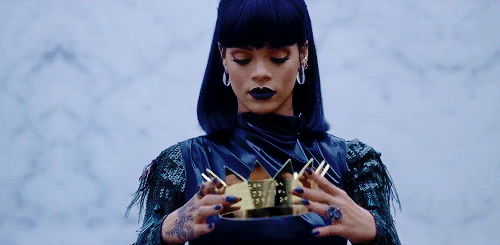
Rihanna is also Igbo
Colonial Nigeria
The establishment of British colonial rule in present-day Nigeria and increased encounters between the Igbo and other ethnicities near the Niger River led to a deepening sense of a distinct Igbo ethnic identity. The Igbo proved decisive and enthusiastic in their embrace of Christianity and Western-style education. Because of the incompatibility of the Igbo decentralized style of government and the centralized system including the appointment of warrant chiefs required for British system of indirect rule, the period colonial rule was marked with numerous conflicts and tension. During the colonial era, the diversity within each of Nigeria's major ethnic groups slowly decreased, and distinctions between the Igbo and other large ethnic groups, such as the Hausa and the Yoruba, became sharper.
The establishment of British colonial rule transformed Igbo society, as portrayed in Chinua Achebe's novel Things Fall Apart. Colonial rule brought about changes in culture, such as the introduction of warrant chiefs as Eze (indigenous rulers) where there were no such monarchies. Christian missionaries introduced aspects of European ideology into Igbo society and culture, sometimes shunning parts of the culture. The rumours that the Igbo women were being assessed for taxation sparked off the 1929 Igbo Women's War in Aba (also known as the 1929 Aba Riots), a massive revolt of women never encountered before in Igbo history.
Aspects of Igbo culture such as construction of houses, education and religion changed following colonialism. The tradition of building houses out of mud walls and thatched roofs ended as the people shifted to materials such as concrete blocks for houses and metal roofs. Roads for vehicles were built. Buildings such as hospitals and schools were erected in many parts of Igboland. Along with these changes, electricity and running water were installed in the early 20th century. With electricity, new technology such as radios and televisions were adopted, and have become commonplace in most Igbo households.
A series of black and white, silent films about the Igbo people made by George Basden in the 1920s and 1930s are held in the British Empire and Commonwealth Collection at Bristol Archives

#african#afrakan#kemetic dreams#africans#brownskin#brown skin#afrakans#african culture#afrakan spirituality#igbo#nigerian#british empire#jamaica#jamaican#barbados#igbo culture#igbo history#rihanna
25 notes
·
View notes